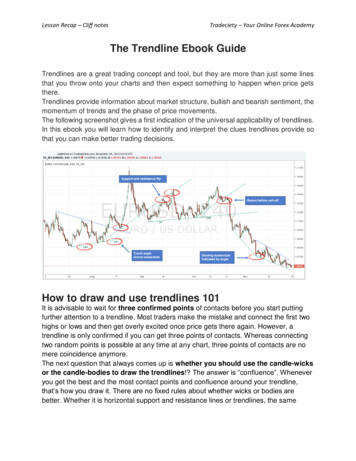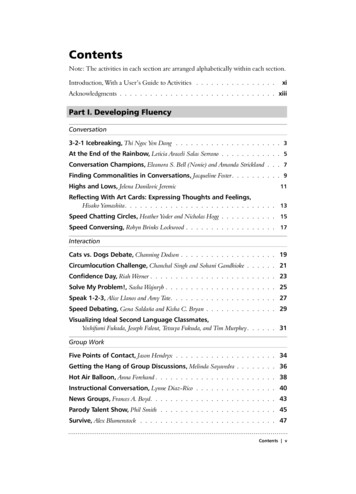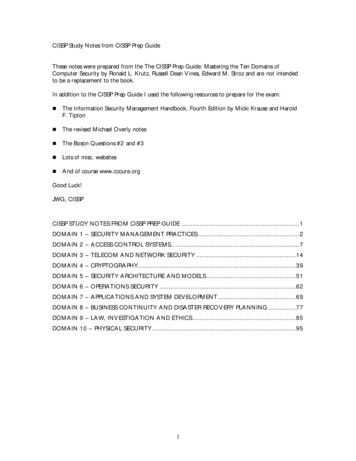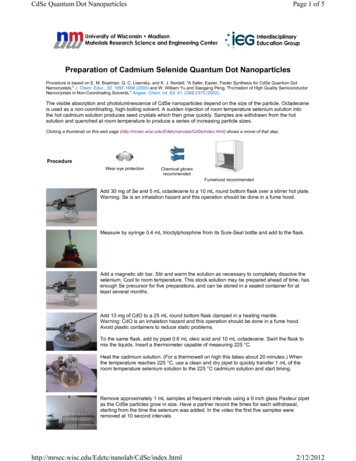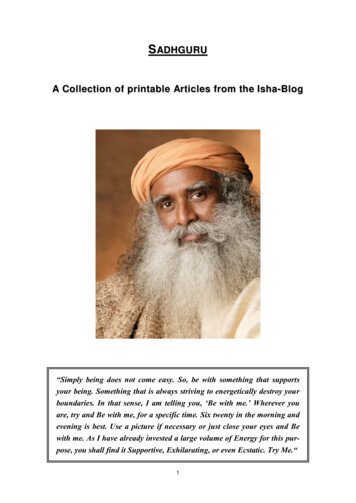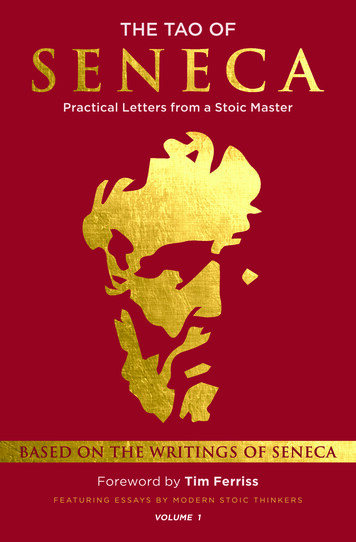
Transcription
VOLUME 1
VOLUME 1
The Tao of Seneca, Volume 1Based on the Moral Letters to Lucilius by Seneca,translated by Richard Mott Gummere.Loeb Classical Library editionVolume 1 first published 1917;Volume 2 first published in 1920;Volume 3 first published 1925.Loeb Classical Library is a registered trademark ofThe President and Fellows of Harvard College.Front Cover Design by FivestarBranding (www.fivestarlogo.com)Book Interior Design and Typography by Laurie Griffin(www.lauriegriffindesign.com)Printed in U.S.A.
THESE VOLUMES ARE DEDICATEDTO ALL WHO SEEK TO BETTERTHEMSELVES AND, IN DOING SO,BETTER THE WORLD.—Tim Ferriss
TABL E OF CON T E N TSHOW TO USE THIS BOOK9LETTER 1On Saving Time17LETTER 2On Discursiveness in Reading19LETTER 3On True and False Friendship21LETTER 4On the Terrors of Death25LETTER 5On the Philosopher’s Mean29LETTER 6On Sharing Knowledge32LETTER 7On Crowds35LETTER 8On the Philosopher’s Seclusion39LETTER 9On Philosophy and Friendship43LETTER 10On Living to Oneself50LETTER 11On the Blush of Modesty52THOUGHTS FROM MODERN STOICS :Elif Batuman55LETTER 12On Old Age62LETTER 13On Groundless Fears66LETTER 14On the Reasons for Withdrawing From the World72LETTER 15On Brawn and Brains78LETTER 16On Philosophy, the Guide of Life83LETTER 17On Philosophy and Riches86LETTER 18On Festivals and Fasting90LETTER 19On Worldliness and Retirement95LETTER 20On Practicing What You Preach100LETTER 21On the Renown Which My Writings Will Bring You105LETTER 22On the Futility of Half-Way Measures109LETTER 23On the True Joy Which Comes from Philosophy115LETTER 24On Despising Death119LETTER 25On Reformation127
LETTER 26On Old Age and Death130LETTER 27On the Good Which Abides134LETTER 28On Travel as a Cure for Discontent137LETTER 29On the Critical Condition of Marcellinus140LETTER 30On Conquering the Conqueror145LETTER 31On Siren Songs150LETTER 32On Progress154LETTER 33On the Futility of Learning Maxims156LETTER 34On a Promising Pupil160LETTER 35On the Friendship of Kindred Minds162LETTER 36On the Value of Retirement164LETTER 37On Allegiance to Virtue168LETTER 38On Quiet Conversation170THOUGHTS FROM MODERN STOICS :Jocko Willink172LETTER 39On Noble Aspirations175LETTER 40On the Proper Style for a Philosopher’s Discourse178LETTER 41On the God Within Us183LETTER 42On Values187LETTER 43On the Relativity of Fame190LETTER 44On Philosophy and Pedigrees192LETTER 45On Sophistical Argumentation195LETTER 46On a New Book by Lucilius200LETTER 47On Master and Slave203LETTER 48On Quibbling as Unworthy of the Philosopher210LETTER 49On the Shortness of Life215LETTER 50On Our Blindness and Its Cure220LETTER 51On Baiae and Morals223LETTER 52On Choosing Our Teachers229LETTER 53On the Faults of the Spirit234LETTER 54On Asthma and Death239
LETTER 55On Vatia’s Villa242LETTER 56On Quiet and Study246LETTER 57On the Trials of Travel251LETTER 58On Being255LETTER 59On Pleasure and Joy267LETTER 60On Harmful Prayers274LETTER 61On Meeting Death Cheerfully276LETTER 62On Good Company278LETTER 63On Grief for Lost Friends280LETTER 64On the Philosopher’s Task285THOUGHTS FROM MODERN STOICS :LETTER 65Donald RobertsonOn the First CauseProfiles of Modern-Day Stoics From Tools of Titans:Jocko Willink, Derek Sivers, Sebastian Junger28 Books On Stoicism288301311339
HOW TO USE THIS BOOKby Tim FerrissAFew of us consider ourselves philosophers. “Philosophy” usuallyconjures images of dense textbooks and academic quibbling withno application to real life. It’s fun for professors, perhaps, but awaste of time for the rest of us.I felt this way for decades. Then, in 2004, I found the work ofLucius Annaeus Seneca, better known as Seneca the Younger orsimply “Seneca.” Born circa 4 BC in present day Spain and raisedin Rome, Seneca was simultaneously an esteemed playwright,one of the wealthiest people in Rome, a famous statesman, andan advisor to the emperor. He had to negotiate, persuade, andstrategize his way through life. Far from spouting philosophyfrom the safety of an ivory tower, he had to constantly deal withuncooperative, powerful human beings and faced disaster, exile,and death head on.Seneca took risks and did big things.His primary philosophy, Stoicism, was founded around 300BC in Athens and can be thought of as an operating system forthriving in high-stress environments. At its core, it teaches youhow to separate what you can control from what you cannot, andit trains you to focus exclusively on the former.Seneca’s Moral Letters to Lucilius—a distillation of his lessons
10THE TAO OF SENECA VOLUME 1learned—changed my life and continues to do so today. You nowhold a version of those letters in your hands, complete with original illustrations, original calligraphy from compatible traditionslike Zen, links to free audio, and more.I’m giving away The Tao of Seneca in the hopes that it changesyour life, and I promise you that it can.Stoicism was designed for doers, and you’ll be in fine companyas a student.Thomas Jefferson had Seneca on his bedside table. Michel deMontaigne had a quote from Epictetus—a handicapped slaveturned famous Stoic teacher—carved into the ceiling of his houseso he would see it constantly. Every year, Bill Clinton reads Meditations by Marcus Aurelius, who was at once a Stoic, emperor, andthe most powerful man in the world. Other proponents includeJohn Stuart Mill, bestselling author Tom Wolfe, and Navy viceadmiral and Medal of Honor recipient James Stockdale, who credited his survival as a prisoner of war (7.5 years, much of it in awindowless 3' x 9' cement cell) to Stoicism.But far from limited to overcoming the negative, Stoicism canalso be used to maximize the positive.For this reason, Stoicism has spread like wildfire throughoutSilicon Valley and the NFL in the last five years, becoming a mentaltoughness training system for CEOs, founders, coaches, and players alike. Super Bowl champions like the Patriots and Seahawkshave embraced Stoicism to make them better competitors.In my own life, the results have been incredible.Whether early-stage investments (e.g., Facebook, Twitter, Uber,Alibaba, and 50 others), books translated into 40 languages(e.g., Tools of Titans), or anything else in the last 20 years ofmy life, I credit nearly all of the biggest successes—and biggestdisasters averted—to my study of Stoicism and, specifically, thewriting of Seneca.
Foreword: How to Use This Book11But keep in mind: reading alone does very little. The ideas inthis book are meant to be applied and this requires practice.Why do I fast for at least one three-day stretch each month?Why do I often schedule “suffer camps” of various types, where Imight endure cold or eat exclusively rice and beans for 3–10 days?Why might I wear the same type of black t-shirt for a weekstraight, along with one pair of jeans, all the while remainingunshaven and asking myself, “Is this the condition that I feared?”All of the above examples are how I use just one letter—Letter 18, On Festivals and Fasting (pg 90). Here’s the gist in afew excerpts:Set aside a certain number of days, during which you shallbe content with the scantiest and cheapest fare, with coarseand rough dress, saying to yourself the while: “Is this thecondition that I feared?” It is precisely in times of immunity from care that the soul should toughen itself beforehand for occasions of greater stress, and it is while Fortuneis kind that it should fortify itself against her violence. Indays of peace the soldier performs maneuvers, throws upearthworks with no enemy in sight, and wearies himself bygratuitous toil, in order that he may be equal to unavoidable toil. If you would not have a man flinch when thecrisis comes, train him before it comes.Let the pallet be a real one, and the coarse cloak; let thebread be hard and grimy. Endure all this for three or fourdays at a time, sometimes for more, so that it may be a testof yourself instead of a mere hobby. Then, I assure you,my dear Lucilius, you will leap for joy when filled with apennyworth of food, and you will understand that a man’s
12THE TAO OF SENECA VOLUME 1peace of mind does not depend upon Fortune; for, evenwhen angry she grants enough for our needs.For though water, barley-meal, and crusts of barley-bread,are not a cheerful diet, yet it is the highest kind of pleasureto be able to derive pleasure from this sort of food, andto have reduced one’s needs to that modicum which nounfairness of Fortune can snatch away.These types of practices make you less emotionally reactive,more aware in the present tense, and more resilient. Perhapscounterintuitively, given the English connotations of “stoic,” thisdramatically increases your ability to feel joy over the small things.As you navigate life, this type of mental toughness trainingalso makes tough decisions easier, whether quitting a job, starting a company, asking someone out, ending a relationship, oranything else.So, where to start?There are many great minds in the Stoic pantheon, includingMarcus Aurelius, Epictetus, and Cato. For me, though, Senecastands out as easy to read, memorable, and surprisingly practical.He covers specifics ranging from handling slander and backstabbing, to fasting, exercise, wealth, and death. His letters read likea Choose-Your-Own-Adventure book for handling the obstacleslife deals you.I suggest you approach this book is the way I approached it:make Seneca part of your daily routine.Set aside 10–15 minutes a day and read one letter. Whether overcoffee in the morning, right before bed, or somewhere in between,digest one letter. Do this for two weeks and it will change you.Feel free to bounce around and skip liberally. This is your book,meant to be customized. Three of my favorites might help you
Foreword: How to Use This Book13get started: Letter 13 On Groundless Fears (pg 66), Letter 18On Festivals and Fasting (pg 90), and Letter 20 On PracticingWhat You Preach (pg 100), which is also hilarious.If you have never been exposed to Seneca before, I’m excitedfor you . . . and envious of you. What a journey you have ahead.As he might say, “Vale.” Seneca used this to close many ofletters, and it is often translated as “Farewell” for simplicity. It’sperhaps better translated several other ways, and my favorite istwo words:Stay strong.May this book serve you as a friend, teacher, and companionon the path.I hope you enjoy the ride as much as I have,TimSan Francisco, CaliforniaTwitter: @tferrissInstagram/Facebook: TimFerrissI am deeply indebted to DailyStoic.com, who generously providedmost of the contemporary interviews in this book. Additionalmodern essays are credited to their respective authors. My sincerethanks to all who were kind enough to contribute to this project.
SUG G E ST EDS HO RT RE A D I N GAIf you ever feel overwhelmed by longer reads in this book, beloware a few 5–10-minute options that punch above their weight.Each of these blog posts explores how to apply practical philosophies in the real world, and the first is the most importantto me personally:Fear-Setting: The Most Valuable Exercise I Do Every Month(tim.blog/fear-setting)Stoicism 101: A Practical Guide for Entrepreneurs(tim.blog/stoicism101)On The Shortness of Life: An Introduction to Seneca(tim.blog/shortness)How to Use Philosophy as a Personal Operating System:From Seneca to Musashi(tim.blog/philosophy)Discovering Kindness In The Storm(tim.blog/kindness)Stoicism for Modern Stresses: 5 Lessons from Cato(tim.blog/less-stress)
Japanese: Sei Kan Mu GaEnglish: Taken together, seikan means watchful waiting.Muga means selflessness or self-renunciation.This suggests sitting quietly as is done in Zen practice.(Read vertically from top right to bottom left.Each character is one word above.)Calligrapher: Noriko Lake
LETTER 1On Saving TimeAGreetings from Seneca to his friend Lucilius.Continue to act thus, my dear Lucilius—set yourself free foryour own sake; gather and save your time, which till lately hasbeen forced from you, or filched away, or has merely slipped fromyour hands. Make yourself believe the truth of my words—thatcertain moments are torn from us, that some are gently removed,and that others glide beyond our reach. The most disgraceful kindof loss, however, is that due to carelessness. Furthermore, if youwill pay close heed to the problem, you will find that the largestportion of our life passes while we are doing ill, a goodly sharewhile we are doing nothing, and the whole while we are doingthat which is not to the purpose.What man can you show me who places any value on his time,who reckons the worth of each day, who understands that he isdying daily? For we are mistaken when we look forward to death;the major portion of death has already passed. Whatever years bebehind us are in death’s hands.Therefore, Lucilius, do as you write me that you are doing:hold every hour in your grasp. Lay hold of today’s task, and youwill not need to depend so much upon tomorrow’s. While we arepostponing, life speeds by.
18THE TAO OF SENECA VOLUME 1Nothing, Lucilius, is ours, except time. We were entrusted bynature with the ownership of this single thing, so fleeting andslippery that anyone who will can oust us from possession. Whatfools these mortals be! They allow the cheapest and most useless things, which can easily be replaced, to be charged in thereckoning, after they have acquired them; but they never regardthemselves as in debt when they have received some of that precious commodity—time! And yet time is the one loan which evena grateful recipient cannot repay.You may desire to know how I, who preach to you so freely,am practicing. I confess frankly: my expense account balances,as you would expect from one who is free-handed but careful. Icannot boast that I waste nothing, but I can at least tell you whatI am wasting, and the cause and manner of the loss; I can give youthe reasons why I am a poor man. My situation, however, is thesame as that of many who are reduced to slender m
tations by Marcus Aurelius, who was at once a Stoic, emperor, and the most powerful man in the world. Other proponents include John Stuart Mill, bestselling author Tom Wolfe, and Navy vice admiral and Medal of Honor recipient James Stockdale, who cred - ited his survival as a prisoner of war (7.5 years, much of it in a windowless 3' x 9' cement cell) to Stoicism. But far from limited to .




